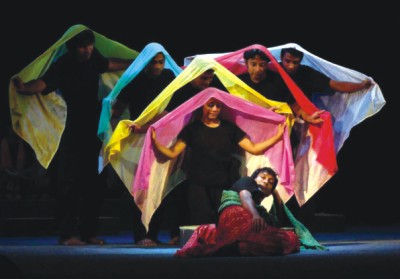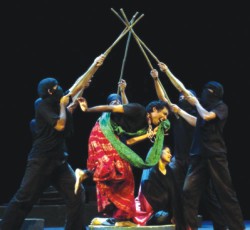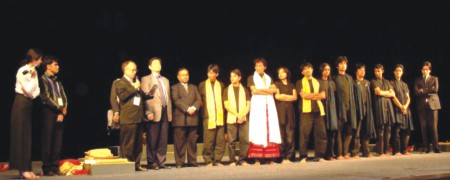|
Reflections
To Beijing with Bhelua Sundari and Amir Sowdagar
Abdul Mannan
‘Ladies and Gentlemen in about fifteen minutes we would be landing in Beijing International Airport. Please return to your seats and put your seats in the upright position and fasten your seat belts' announced the stewardess aboard China Eastern Airlines Flight MU 2036. To understand the announcement in English one would have to really stretch one's hearing abilities. It is practically impossible to distinguish the Chinese announcement from English. Communicating in English is still a major problem in China. With the Olympics just around the corner many young Chinese are taking crash courses in English. This is one area where India is one step ahead of either China or Vietnam when it comes to attracting foreign direct investment, especially in the service sector.
 |
CAT performs Bhelua Sundari at in the North Theatre auditorium of the Central Academy of Drama in Beijing. |
This was my second visit to Beijing in nine years, the first one being more important and from the point of the Chinese Government quite crucial as well. It was in the month of June 1999 when as an Executive Committee member of the Federation International de Students Unversiade (FISU) I was invited to attend its Committee meeting in Beijing. The Mayor of Beijing was our host. My membership was due to the fact that I was then the Chairman of the Association of the Universities of Bangladesh (AUB). Our Committee had a very important task to visit the sports venues in Beijing, assess their quality and certify whether Beijing could be considered to host the 2008 Olympics. The Committee was also to assess the preparedness of the Beijing chapter of the FISU whether things were in proper place to host the 2001 University Games. Beijing was less busy in 1999 and when my Thai Airways flight from Bangkok landed at Beijing the airport was much quieter than it is today. When I entered the immigration area there was a Chinese protocol official deputed for me. She received me as soon as I entered the immigration hall, had my passport stamped and within minutes I was collecting my bags. To my utter surprise I saw a black limousine waiting outside for me with a police escort. Such extravagance was due to the fact that I was a member of an important team that would certify Beijing as the right city to host the 2008 Olympics. We were housed in the Palace Hotel, next to the Tiananmen Square. This hotel is normally reserved for state guests, I was told. My 2008 mission, just weeks ahead of the Beijing Olympics and within seven days of the tragic and devastating earthquake in Sichuan was lot different. As the President of the Centre for Asian Theater (CAT) from Bangladesh I was invited to attend the 3rd Asia Theatre Education Centre (ATEC) Forum in Beijing. CAT would perform the traditional palagaan from Bangladesh “Bhelua Sundari” and Professor Shafi Ahmed from Jahangir Nagar University would present a paper on 'Stage Design Practices' in Bangladesh.
 |
| CAT's Bhelua Sundari has been adapted in the form of a palagan. |
From Dhaka to Beijing via Kunming was about a five- hour journey by China Eastern airlines and an hour's stopover in Kunming. The immigration formalities were completed in Kunming. The flight on board 737 aircraft certainly had room for improvement, and the food is more made to cater to the taste of the Chinese passengers, though the flight was an international one. Departing at 2.00 p.m. from Dhaka, we landed at 10.00 p.m. local time in Beijing. By the time we claimed our baggage and came out of the arrival lounge it was 11.00 p.m. and by Chinese standards it was well into the night. In China people finish their lunch by 11.00 a.m. and by 6 in the evening they are eating dinner. During our five-day stay in Beijing we had to attend two official dinners at 4.30 in the afternoon. Waiting outside to receive us was Faiyaz Murshid Kazi, the First Secretary at our Embassy in Beijing. A bachelor by choice, Kazi is a remarkable person and without his help and last minute intervention for the Chinese visa for our fifteen member team this trip would never have been possible. To receive us was also present Kabir, a student at the Central Academy of Dram, the host institution for the forum. Kabir had been studying at the Academy for the last four and half years. His Chinese was immaculate. Purna Chakma, a staff of Bangladesh Shilpakala Academy and a student at the Academy tried his best to make our stay in Beijing comfortable. The additional advantage was Purna's Mongoloid features that made him appear like any other Chinese. Bargaining during shopping was immensely enjoyable with Purna around. Beijing is a place where the seller asks 500 Yuan for a mobile phone set and sells it for 50. If you do not have someone like Purna with you, you may just be taken for a ride.
There was also a small contingent of volunteers from the Academy, who spoke very good English and warmly welcomed us. The airport is about 45 km from the City and by the time we checked in the traditional Hejingfu Hotel in the Non Luo Gu Xiang area, a small township declared as world heritage, it was 2.00 p.m. in the morning. As the hotel did not have any night time dining facilities some of the team members went to bed quite hungry, but I can bet not angry. The reception party was so warm and wonderful.
 |
| Introducing the performers from Bangladesh. |
ATEC was founded in October 2005 in Beijing with the approval of the Ministry of Education of P.R. China. The main objectives of ATEC is to establish an effective network to connect theatre schools and organisations in Asia and enhance communication on theatre education between different countries and areas in Asia, to promote the development of theatre education, creation and research by providing a platform for all the students, teachers and researchers who are devoted to the study and practice of theatre in Asia. In P.R. China there are 600 universities out of which 36 have departments imparting education in theatre. Besides universities there are independent academies offering diplomas and degrees in theatre. The ultimate aim of ATEC is to bring under its umbrella as many universities and institutions as possible. Besides universities from China there are members from Singapore, Korea, Japan, Hong Kong, India and Australia. During a formal meeting with Professor Xu Siang, the General Secretary of ATEC and President of Central Academy of Drama China, he asked us whether CAT would consider becoming a member of ATEC. We said it would be an honour for CAT. The opening of the 3rd ATEC International Forum on May 18 in the North Theatre auditorium of the Academy was very colourful and attended by guests and students of the Academy. Though the deliberations were mostly in Chinese, Korean and Japanese arrangements were made for simultaneous English translation. The student volunteers of the Academy made an all out effort to see that the guests were comfortable and taken care of.
On the inaugural day the second year students of the Academy were to stage a three hour long play, titled 'Princess De Ling and Empress Dowager Ci Xi.' The play was set in 19th century China during the Qing Dynasty. Just before the performance began the organisers informed us that as the Chinese Government had declared a three day mourning to honour the victims of the Sichuan earthquake outside guests would not be allowed to attend the performance. Everyone appreciated the announcement and agreed to perform under the changed circumstances. Still the auditorium was packed with the teachers and students. Their enthusiasm was extremely impressive.
CAT was originally scheduled to have two performances of Bhelua Sundari on May 20. Again because of the guest restrictions it was decided we would have only one performance in the evening. Though the guest list was scaled down, still a good number of Bangladeshis residing in Beijing came with their family members to watch the staging of our show. The Bangladesh Ambassador, H.E. Munshi Faiz Ahmed came with his wife and so did other embassy staff. Mr. Faiyaz came quite early to see that everything was in order. I briefed our lead performer Shahdat Hossain in the back stage to honour the victims of the Sichuan earthquake before the show began. He went a bit further and requested the audience to stand in silence for a minute and pay their respect to victims of the tragedy. The official interpreter interpreted Shadat's message. It just had a hypnotic effect. Every Chinese attending the show was moved by our gesture.
Bhelua Sundari is a musical play and is assumed to have originated in 16th century Bengal. It is included in an early 20th century collection of ballads from Bengal known as Purbobango Gitika. CAT has adapted the ballad with the aim of giving it a theatrical presentation. The traditional form called palagan (literally song play), one of many secular indigenous forms, is the basis for CAT's theatre production Bhelua Sundari. Directed by Sydur Rahman Lipon under the guidance of Kamaluddin Nilu it is story of love between Amir Sowdagar and Bhelua Sundari. There has to be a naughty sister-in-law (Amir's sister) Bibala, whose conspiracies makes Bhelua's life miserable. Then there is the villain Bhola Sowdagar who kidnaps Bhelua. It is a typical Bangla folk tale that ends in tragedy with the death of Bhelua and Amir Sowdagar becoming a mystic baul. Though the play was in Bangla the Chinese abstract was distributed to audience in advance and the audience enjoyed the one hour forty-five minute show in pin drop silence. The teachers and the students of the Academy was impressed by the stage management and especially the performance of the lead performer Shadat Hossain, who alone played the role of the Narrator, Bhelua, Bhelua's father, mother and brother, Amir Sowdagar, Hironi Pigeon, Bibala, Bhola Sowdagar and Shokhi. It was just a superb performance. After the show was over the Bangladesh Ambassador came and personally congratulated the performers. The teachers and the students of Academy were full of praise and wished that CAT would do another performance. Time and circumstances were not on our side. the next day was reserved for a visit to the Great Wall and the Summer Palace. A visit to China without visiting these two historical sites is like visiting Agra and not going to Tajmahal. When we were saying good bye on the evening of the 21st the organisers did not forget to tell us 'we will meet again in Beijing in May 2009.' Our flight MU 2035 left early next morning. Good buy Beijing. I am sure Bhelua Sundari will be remembered by the students and teachers of the Central Academy of Drama in Beijing for long.
Abdul Mannan is a former Vice-chancellor of Chittagong University. Currently he teaches at the University of Liberal Arts Bangladesh.
Copyright
(R) thedailystar.net 2008 |
